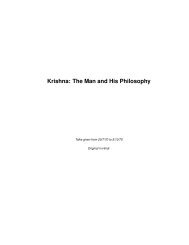Hyakujo: The Everest of Zen, with Basho's Haikus - Oshorajneesh.com
Hyakujo: The Everest of Zen, with Basho's Haikus - Oshorajneesh.com
Hyakujo: The Everest of Zen, with Basho's Haikus - Oshorajneesh.com
Create successful ePaper yourself
Turn your PDF publications into a flip-book with our unique Google optimized e-Paper software.
CHAPTER 2. THE GREAT PEARL<strong>The</strong> Japanese haiku poet, Basho, was born in 1644, the son <strong>of</strong> a samurai in the service <strong>of</strong> the lord<strong>of</strong> Ueno castle. As a young boy, Basho became the page and study <strong>com</strong>panion <strong>of</strong> the nobleman’seldest son, and together they learned, among other skills, the art <strong>of</strong> making verse.On the death <strong>of</strong> his master, Basho went to Edo – now Tokyo – where he studied verse under Kigin.He then became a disciple <strong>of</strong> the <strong>Zen</strong> master, Buccho.Basho’s fame as a master poet spread. He began to attract disciples <strong>of</strong> his own.Journeying became Basho’s life-style, providing him <strong>with</strong> a chance to observe and write <strong>of</strong> nature,<strong>with</strong> which he felt such a deep affinity.He once wrote, ”All who achieve greatness in art possess one thing in <strong>com</strong>mon: they are one <strong>with</strong>nature. Whatever such a mind sees is a flower, and whatever such a mind dreams <strong>of</strong> is the moon. Itis only a barbarous mind that sees other things then flowers, merely an animal mind that dreams <strong>of</strong>other than the moon.”<strong>The</strong> flower and the moon are only symbolic. What he is intending to say is that the really silentmind can only see the greatest in existence, the most beautiful, the most truthful. He can see onlyflowers and moons. In his status, in his height, he cannot see the mean and ugly things <strong>of</strong> which thehuman mind is so filled up. He calls this mind, which has not known the experience <strong>of</strong> emptiness, abarbarous mind – a beautiful definition <strong>of</strong> a barbarous mind.<strong>The</strong> mind <strong>of</strong> a buddha will only see flowers all around. <strong>The</strong> mind <strong>of</strong> a buddha reclining will see themoon and the stars and all that is beautiful in the darkness <strong>of</strong> the night. Whether it is morning orevening, it does not matter, the no-mind only reflects the most precious, and the so-called mind thatwe have is only concerned <strong>with</strong> the ugliest – it is barbarous.When <strong>Hyakujo</strong> returned to Yueh Chou, he lived a retired life, concealing his abilities and outwardlyappearing somewhat mad. It was at this time that he <strong>com</strong>posed his sastra, called, ”A Treatise SettingForth the Essential Gateway to Truth by Means <strong>of</strong> Instantaneous Awakening.”Later, this book was stolen and brought to the Yangtse region and shown to Ma Tzu. After readingit carefully, Ma Tzu declared to his disciples: ”In Yueh Chou there is now a great pearl. Its lusterpenetrates everywhere freely and <strong>with</strong>out obstruction.”Ma Tzu was making a pun on <strong>Hyakujo</strong>’s original surname <strong>of</strong> Chu. <strong>Hyakujo</strong> was Ma Tzu’s discipleand finally his successor.Maneesha has asked these sutras for today:BELOVED OSHO,ON ONE OCCASION HYAKUJO SAID, ”IF WE ARE ATTACHED TO A VIEWPOINT THAT WEARE NATURALLY THE BUDDHAS AND THAT WE ARE IN ZEN BUDDHISM BECAUSE WEARE ORIGINALLY PURE AND ENLIGHTENED, WE ARE AMONG NON-BUDDHISTS WHO DENYCAUSALITY.”<strong>Hyakujo</strong>: <strong>The</strong> <strong>Everest</strong> <strong>of</strong> <strong>Zen</strong>, <strong>with</strong> Basho’s <strong>Haikus</strong> 18 Osho
















